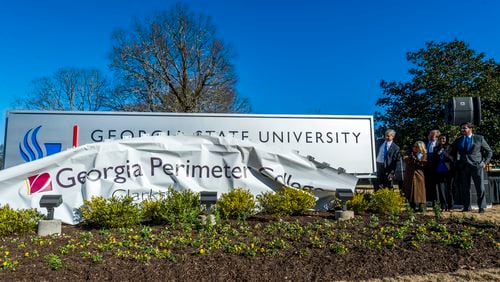Rick Diguette is a frequent Get School contributor on higher ed issues. He is a local writer who retired from college teaching earlier this year.
In this piece, Diguette discusses how the absorption of Georgia Perimeter College into Georgia State University has rendered the Move on When Ready program, which he worked with closely, less responsive and more complicated.
MOWR is a dual enrollment program in which Georgia high school students take college classes. While Diguette focuses on how consolidation has impacted MOWR, he also touches on the dilemma of MOWR. At the same time the governor touts it, some top high schools counsel their students away from it, directing them to AP or IB courses. The high schools maintain their students gain more from AP/IB classes. The state of Georgia ought to underwrite research comparing the college readiness, success and completion of students who opted for MOWR over AP/IB.
I want to share Diguette's piece because the University System of Georgia promotes the benefits of consolidations. However, the ultimate goal of consolidation -- whether it's colleges combining or school districts -- is cost savings. I've never seen it happen without someone or some place ending up with less.
By Rick Diguette
As a result of its consolidation with Georgia State University, Perimeter College's very popular Move On When Ready program has changed and not necessarily for the better. Modifications to the program adversely affect the way students get the information they need to decide if dual enrollment is right for them. And even when they have that information, they are not likely to receive the guidance necessary to complete the application process, get admitted to the college, and register for classes.
For one thing, beginning earlier this summer one MOWR coordinator was tasked with carrying out a variety of time-consuming administrative and customer service functions for all five Perimeter College campuses. These include visiting metro Atlanta high schools to promote the program and explain its finer points, responding to hundreds of calls and emails from parents and students on a weekly basis, scheduling and conducting orientation sessions for as many as 1,300 new students each summer, and providing guidance counselors at more than 75 area high schools with time-sensitive registration and grade reports.
The other major change to the program affects admissions and registration, which will now be handled by rank-and-file enrollment services personnel. In the past, MOWR coordinators at each Perimeter College campus and staff vetted and processed admissions documents for these students, including SAT/ACT scores, high school transcripts, lawful presence credentials, and the all important MOWR Student Participation Agreement.
They accomplished this while also fielding the many questions parents, students, and high school guidance counselors typically have about the online college application at GAfutures.org, a website that can seem more like a labyrinth than a navigable information portal.
Credit: Maureen Downey
Credit: Maureen Downey
As the former coordinator for the Dunwoody campus, I can attest to at least one important truth about dual enrollment. Many metro Atlanta students must deal with high school counselors and/or principals who would rather see them sign up for Advanced Placement classes. This means they must rely on the campus coordinators for the guidance and assistance they're not getting at their high schools.
Whether one MOWR coordinator will be able to meet the needs of students at all five Perimeter College campuses is open to question. Some people would like to believe that a new and improved FAQ link or a redesigned webpage will do the trick, which compels me to bring up another truth, this one strictly related to consolidation.
When Georgia State and Perimeter College merged their admissions and registration processes last summer, people like me soon had to cope with an array of technology problems which often left us scrambling to admit and register students, and this was true for MOWR applicants as well as entering freshmen, transfers, and transients. To make matters worse, there was a reluctance on the part of the downtown campus to take ownership of these problems even though it has been calling all the shots since January of 2016. Fixes were slow in coming, when they came at all. Some of these problems were simply ignored, while new problems continued to arise.
The changes being made to the Perimeter College MOWR program are firmly grounded in the consolidation mandated by the Board of Regents in 2015. Georgia State University's downtown Atlanta campus, which has its own MOWR program of about 200 students, simply does things differently. And if there has been one constant during the consolidation, it's that Perimeter College had to change. Someone even turned this fact into a humorous equation needing no explanation: A (GSU) + B (Perimeter College) = A. But can a program with 1,400 students at five different campuses be administered like one with only 200 students all attending the same campus?
The powers that be at Georgia State seem to think so, or they are constrained to think so in light of the University System of Georgia's recently announced Comprehensive Administrative Review, which "is a system-wide initiative focused on improving administration through creating efficiencies, streamlining processes and finding ways to be more effective with USG resources." This appears to be a variation on doing more with less, which in recent years has become a familiar refrain at Perimeter College.
That 11th and 12th graders can satisfy high school graduation requirements while earning transferable college credits at virtually no cost tells me the Perimeter College MOWR program will survive despite the ill-conceived changes Georgia State has put in place.
Nonetheless, parents and students should understand that during the MOWR application and registration process much will depend on their ability to deal with frustrating procedures, which have only grown worse since consolidation. Their patience will be tried when phones don’t get answered and emails don’t get returned in a timely fashion. And they can expect to be asked to submit admissions documents more than once simply because an earlier submission has found its way into a black hole somewhere. Time will tell if these are merely growing pains or self-inflicted wounds that do lasting damage to a very popular school choice program.
About the Author








